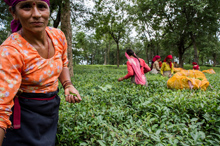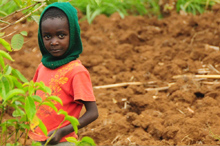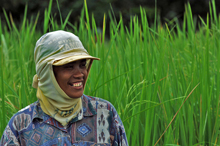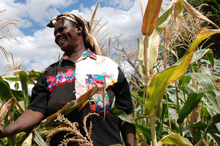Why women should own their land
When women own the land they till, families tend to be better fed, better educated and healthier. Here’s why land matters for women – and what the international community can do to help.
Land Matters was a month-long global conversation on Devex during September 2013. While this particular campaign to raise awareness about land rights for global development has since come to a conclusion, the importance of land remains a key issue for all development practitioners working toward a more sustainable future.
Devex will continue to update this website periodically, but in order to ensure you stay in the know about everything that is impacting global development, sign-up for Newswire to receive a comprehensive daily look at breaking news, analysis and opinion directly to your inbox.
Most smallholder farmers in the developing world are women. They offer knowledge of the land they till and entrepreneurial skills to increase the productivity, crop diversity and value of their plots. Yet many women don’t own their land. Official titles and clear rights – in cities and rural areas – can help women play a greater role in the way land is managed, developed, marketed and passed on to future generations.

When women own the land they till, families tend to be better fed, better educated and healthier. Here’s why land matters for women – and what the international community can do to help.

To reduce hunger and malnutrition, we must afford land rights, above all, to poor, rural women, writes Landesa’s Elisa Scalise in this guest commentary.

Why should the world care about women’s right to land? The answer is actually very simple, writes Agnes Quisumbing, senior research fellow at the International Food Policy Research Institute.

In Kenya, a new Constitution and several policy reforms are strengthening women's right to own land and other property. But much remains to be done, writes Patricia Kameri-Mbote in this guest commentary.

Land matters for sustainable economies, livelihoods, human rights, and the environment- the development community cannot afford for land to be a trend. Expert panelists from DAI, Chemonics International, USAID, and Omidyar Network sat down with Devex to discuss what land rights mean for the future of global development.
In Ethiopia, land registration and the reform of the family code may have mutually reinforcing effects on women’s rights and welfare, Neha Kumar and Agnes R. Quisumbing conclude in a research paper for the International Food Policy Research Institute.
While statutory law in Ghana grants women similar land rights to men, in much of the country, these rights are governed by customary institutions that assign greater control over land to men. But women's rights to land they cultivate is changing. Here's how.
From the World Bank, a checklist of actions to successfully integrate gender issues in land policy and administration projects, in all of the four project stages: identification, design and preparation, appraisal, and implementation, supervision and completion.
This article tells the story of an 80-year-old woman from Botswana who won a court battle to keep her ancestral home. The landmark ruling rejected customary land rights that normally favor male heirs.
This short video draws a link between increased land rights for women and an increase in income that can enable girls in the family to stay in school.
Knocking down gender barriers like land ownership and access to credit is key to ensuring food security in Asia-Pacific, according to a report from the Asian Development Bank. How so? Devex asked Imrana Jajal, ADB's senior social development specialist on gender.
See how the USAID Tajikistan Land Reform project is helping tens of thousands of women on the border of Afghanistan claim rights to land and secure a better future.
A woman’s ability to own, inherit and control land and property is absolutely vital to her ability to access resources and participate in the economy. The Thomson Reuters Foundation and the World Bank partnered to better understand legal frameworks that affect women’s ability to access resources, with a particular focus on the legal and cultural barriers to women’s secure land rights.
The high-level draft post-2015 development agenda highlights the importance of secure property rights. In an exclusive opinion for Devex, Karol Boudreaux from the Omidyar Network explains why these rights matter and must be defended to empower the poor, especially in Africa.
Ashok Sircar, India program director at Landesa, analyzes the obstacles preventing Indian women from exercising their right to inherit land, and discusses potential policy solutions.
In 1998, the Ethiopian government initiated the largest low-cost land certification program at the time in sub-Saharan Africa. Much of the land was registered exclusively in the name of the head of household, traditionally male. What has happened since joint titling projects began to include women's names on the land deed?
Join the conversation